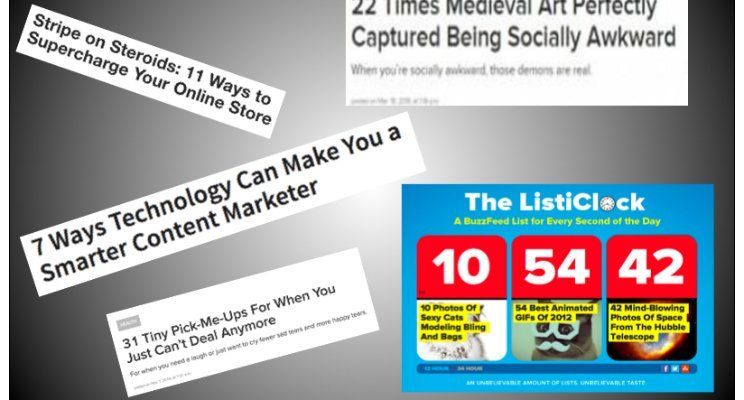Listicles, you cannot scroll through a significant website or new program without seeing one. Arguably made famous by Buzzfeed, listicles are journalistic or blogging tools with many impacts. Start with a title that tells you there is a list of information. The listicle is a portmanteau of "list" and "article."
- "Three easy changes to decorate your altar for Mabon."
- "Six things you should never do during a Great Rite."
- "The nine sketchy things no one knows about Fae."
I will help you write (maybe the first!) an article that illustrates how well you know #ThatPaganLife. Perhaps it's something that will help your coven, personal craft business, or betters the Pagan lifestyle for all of us. Creating listicles should be fun and easy, and I hope you'll share your knowledge.
There is an opening paragraph, then the list of items. Each item may have as little as one content line or several sections. How long is predicated on several things:
- Your audience – Pagans, generally want it short and to the point, although some might look for fewer bullets and more detail.
- Your style – Write your way. Use that to your advantage if you're known for short, pithy sayings.
- The topic – Deeply technical areas merit more attention; however, don't drag on. If you are an expert, you should be able to make your point in a few sentences (more on this later). If you need to write more, consider a different format for the article.
Why use this format? It draws immediate attention and generates a call to action. Attention generates eyeballs and revenue, whether direct or indirect. Why? Numbers indicate complex quantitative data ("Five Weather Patterns to Know During a Full Moon"). Qualitative data, if it's from sources we know, trust, or respect ("Mother's Four Favorite Yule Appetizers"). People are most likely to act upon practical and pragmatic information in short bites.
- Demonstrate your "Command of Data."
- Einstein wrote, "If you can't explain it to a six-year-old, you don't understand it yourself." Therefore, using lists shouldn't imply simple or less relevant content. Instead, lists demonstrate that you understand a topic well enough to break it down and explain it in relatable, everyday terms. There are steps, an order of precedence, or a relatable number for highly technical subjects. For example, "Three parts of a good ritual," "Nine Tips for making herbal remedies," or "Four Steps You Must do to when Designing Mandalas."
- Writing is your opportunity to demonstrate your expertise, passion, and, most importantly, your capability to the world. But, unfortunately, anyone can over-complicate an article.
- Organize – This shows a depth of understanding. Creating a clear and understandable structure or taxonomy illustrates how well you know a topic.
- Be to the point – Brevity and completeness combined show expertise.
- Make it actionable and/or action-oriented – Briefly describe some techniques for putting your point into action. If it requires some foundational skill or knowledge, say so. ("Readers are assumed to have a basic background in Asatru traditions")
- Be "all in" with your headline/title
- Unless you have an established fan base, your title is the only reason people will read your article. It's the first thing they see. So whether you're pitching an idea or self-publishing, you need to state the one thing people will take away from the article. Make it clear and compelling. Numbers add credibility. You clicked on this headline, so there's your first bit of proof.
- If you're a great writer or a muse, you know this and can spout engaging headlines without effort. If not:
- Start with a placeholder title.
- Write your article.
- Your title takes about 10% - 15% of the effort of writing the article. Give yourself the luxury of time to create an engaging opener. You only get one shot per article.
- Crafting that sweet title:
- What's the one thing people will take away?
- Is it relatable to everyone? "Better GRoTP for Lefties" will be passed over by 99.9999999% of the world. Make it work out of context.
- Numbers are compelling. Adding the correct number will draw in an audience.
- A promise made is a promise kept. What are you promising with your title, and do you keep it?
- Less is more. Is every word necessary?
- An article entitled "27 Personal Rituals You Should Do Every Morning" will likely raise eyebrows and be passed over. Why?
- The number must be credible or incredible. Twenty-seven things are not either as, even assuming each item takes only two minutes, completing the list is nearly an hour gone. Incredible invites a closer look ("999 ways to make wands", "1,001 ways to screw up your evocations").
- Every morning? In today's world, we have a much more varied routine. We also include weekends in this headline, when generally, people's habits change over the weekend.
- It's not very specific. Try "Three Things the Spiritually Adept do."
- Add a picture that tells the entire story within the image. For example, many listicles have pictures (using animated gifs) for each bullet.
- Keep notes
- Writing takes time. Start with your list and develop the article around it. There is no need for it to be perfect the first time editing until you get it to a manageable pitch. A direct and focused article tells people you are an expert.
- Many authors will tell you, "There's no good writing, just great editing."
- Lists can become addicting. I once showed an artist, a most unlikely of list makers, this simple technique. On her first anniversary, she sent me pictures of three-page lists of tasks and activities.
- The Phrase that Pays
- In the early morning of the modern Internet (1997), RFCs (Request For Comments) were used to define how phrases in standards documents. The controlling body, the IETF (Internet Engineering Task Force), still exists and is quite active.
- The RFC post, Keywords for use in RFCs to Indicate Requirement Levels, is the set of words used to signify requirements. For example, "Should, Should Not, Must, May, Optional" have specific contexts. Use them in your list's titles or headlines to generate impact.
- Other attention-grabbing words include "Best, Worst, First, Last." Remember this point when creating your title. Keep that promise, and your readers will come back for more.


